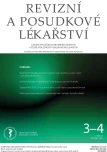The WHODAS 2.0 questionnaire and the possibilities of its use not only in assessment activities
Authors:
Petra Sládková 1,3
; K. Svěcená 1,2,3
Authors‘ workplace:
Klinika rehabilitačního lékařství, 1. lékařská fakulta, Univerzita Karlova a Všeobecná fakultní nemocnice v Praze
1; Klinika adiktologie, 1. lékařská fakulta, Univerzita Karlova a Všeobecná fakultní nemocnice v Praze
2; Západočeská univerzita v Plzni, Fakulta zdravotnických studií
3
Published in:
Reviz. posud. Lék., 25, 2022, č. 3-4, s. 55-59
Category:
Original Articles, Review Articles, Case Reports
Overview
Only an etiological diagnosis is insufficient for an objective assessment of the impact of the disease on the overall state of health and quality of life of persons with disabilities. As part of the assessment activity, the entire psycho-sensorimotor potential of a person with a disability is assessed. Effective tools are still being sought that could functionally evaluate the impact of a congenital developmental defect, injury or disease on determining the extent of limited activity and participation restriction. WHODAS 2.0 is among the tools that evaluate the functional abilities of people with disabilities, but from their subjective point of view. A detailed manual on how to proceed when filling it out was translated into Czech. The text describes the rules for filling out the questionnaire, its structure, as well as possible pitfalls that may arise during the subsequent evaluation. At the end of the article, a sample example of the clinical application of the 12 - question version of the questionnaire is presented. The presented article can serve not only as a guide for the practical use of this questionnaire, but also for thinking about its use in assessment activities.
Keywords:
disability – Quality of life – functional evaluation – WHO
Sources
1. Sládková, P. et al. Možnosti využití Mezinárodní klasifikace funkčních schopností, disability a zdraví (MKF) v rehabilitaci. Rehabilitácia, 2022, 59(3), s. 237–244.
2. Zákon č. 108/2006 Sb., o sociálních službách, ve znění pozdějších předpisů.
3. WHO. WHODAS 2.0. 2. přeložená a doplněná elektronická forma testu. Praha: ÚZIS (on line), 31.8.2018. WHO Disability Assessment Schedule 2.0 – ÚZIS ČR (uzis.cz) ÚZIS ČR, 2016. Dostupné na www: https://szv.mzcr.cz/Vykon/Detail/21612.
4. WHO. Measuring Health nad Disability: Manual for WHO Disability Assessment Schedule WHODAS 2.0. Geneva: WHO (online), 16.7.2012. WHO Disability Assessment Schedule (WHODAS 2.0).
5. WHO. Mezinárodní klasifikace funkčních schopností, disability a zdraví. 2. přeložené a doplněné vydání. Praha: ÚZIS (online), 2020. Dostupné na www: https://www.uzis.cz/res/f/008317/ mkf-cz-002.pdf.
6. Topinková, E., Jurášková, B., Hrkal, J. et al. Hodnocení disability s využitím nástroje WHODAS 2.0 u geriatrických pacientů. Pilotní studie WHODAS-GERI. Geriatrie a Gerontologie, 2021, 10(1), s. 3–11.
7. Pfeiffer, J. et al. Koordinovaná rehabilitace. České Budějovice: Jihočeská univerzita, 2014, 176 s. ISBN 978-80-7394-461-2.
8. Sládková, P. Sociální a pracovní rehabilitace. Praha: Karolinum, 2021, 101 s. ISBN 978-80-246-4986-3.
9. Vacková, J. et al. Sociální práce v systému koordinované rehabilitace. Praha: Grada Publ., 2020, 202 s. ISBN 978-80-271-2434-3.
10. Prodinger, B., Cieza, A., Oberhauser, C. et al. Toward the international classification of functioning, disability and health (ICF) rehabilitation set: a minimal generic set of domains for rehabilitation as a health strategy. Archives of physical medicine and rehabilitation, 2016, 97(6), s. 875–884.
Labels
Medical assessment Occupational medicineArticle was published in
Medical Revision

2022 Issue 3-4
-
All articles in this issue
- International classification of functioning, disability and health not only in assessment medicine
- Diseases of the liver and pancreas from the point of view of disability assessment
- The WHODAS 2.0 questionnaire and the possibilities of its use not only in assessment activities
- Treatment of hyperlipoproteinemia and hypolipidemics from the perspective of the reviewing
- Index 2022
- Medical Revision
- Journal archive
- Current issue
- About the journal
Most read in this issue
- Diseases of the liver and pancreas from the point of view of disability assessment
- International classification of functioning, disability and health not only in assessment medicine
- The WHODAS 2.0 questionnaire and the possibilities of its use not only in assessment activities
- Treatment of hyperlipoproteinemia and hypolipidemics from the perspective of the reviewing
